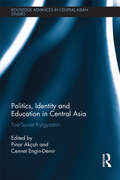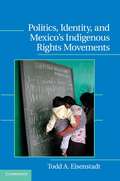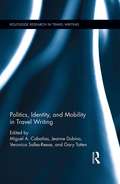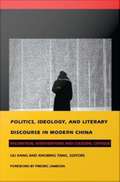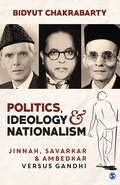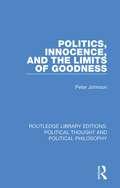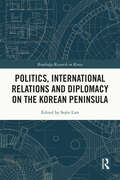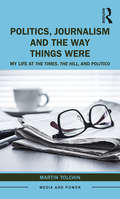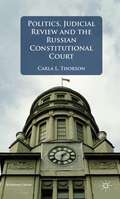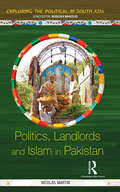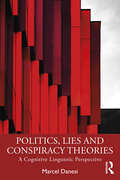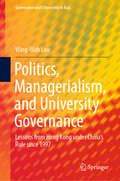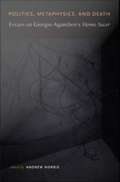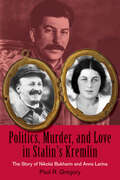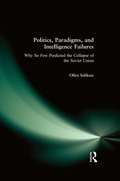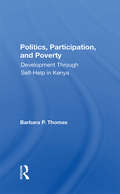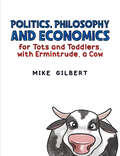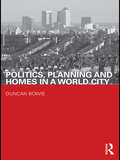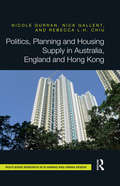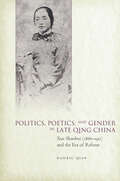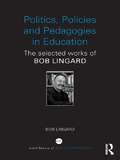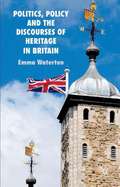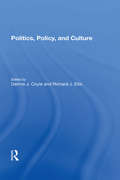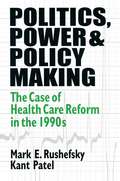- Table View
- List View
Politics, Identity and Education in Central Asia: Post-Soviet Kyrgyzstan
by Pınar Akçalı Cennet Engin-DemirFocusing on the areas of politics, identity and education, this book looks at some of the most pressing and challenging issues that Kyrgyzstan faces in the post-Soviet era. It argues that Kyrgyzstan is challenged with oscillations between the old and the new on the one hand, and domestic and international on the other. The book analyses the process of post-Soviet transition in today’s Kyrgyzstan by focusing on the political elites, some of the major identity problems and educational issues. It discusses how Kyrgyzstan’s first president in the post-Soviet era had already been an exceptional leader even prior to the collapse of the Soviet Union in terms of his democratic and liberal tendencies. The book goes on to look at how identity is a major factor in the country, shaped to a large extent by genealogical factors and patron-client mechanisms on the one hand, and religious considerations on the other. Finally, it highlights how education has been perceived as a very influential agent of socialization that develops not only literacy and other skills, but also common attitudes and values that are considered essential to any society. By evaluating these three areas, the book argues that Kyrgyzstan cannot isolate itself from the demands, priorities and pressures of international actors, which sometimes are in conflict with the country’s domestic conditions. It is of interest to students and scholars of Asian Studies, Politics and International Relations.
Politics, Identity, and Mexico’s Indigenous Rights Movements
by Todd A. EisenstadtDrawing on an original survey of more than 5,000 respondents, this book argues that, contrary to claims by the 1994 Zapatista insurgency, indigenous and non-indigenous respondents in southern Mexico have been united by socioeconomic conditions and land tenure institutions as well as by ethnic identity. It concludes that - contrary to many analyses of Chiapas's 1994 indigenous rebellion - external influences can trump ideology in framing social movements. Rural Chiapas's prevalent communitarian attitudes resulted partly from external land tenure institutions, rather than from indigenous identities alone. The book further points to recent indigenous rights movements in neighboring Oaxaca, Mexico, as examples of bottom-up multicultural institutions that might be emulated in Mexico and elsewhere in Latin America.
Politics, Identity, and Mobility in Travel Writing (Routledge Research in Travel Writing)
by Jeanne Dubino Miguel A. Cabañas Veronica Salles-Reese Gary TottenThis collection examines the intersections between the personal and the political in travel writing, and the dialectic between mobility and stasis, through an analysis of specific cases across geographical and historical boundaries. The authors explore the various ways in which travel texts represent actual political conditions and thus engage in discussions about national, transnational, and global citizenship; how they propose real-world political interventions in the places where the traveler goes; what tone they take toward political or socio-political violence; and how they intersect with political debates. Travel writing can be viewed as political in a purely instrumental sense, but, as this volume also demonstrates, travel writing’s reception and ideological interventions also transform personal and cultural realities. This book thus examines the ways in which politics’ material effects inform and intersect with personal experience in travel texts and engage with travel’s dialectic of mobility and stasis. In spite of globalization and efforts to eradicate the colonial vision in travel writing and in travel writing criticism, this vision persists in various and complex ways. While the travelogue can be a space of discursive and direct oppression, these essays suggest that the travelogue is also a narrative space in which the traveler employs the genre to assert authority over his or her experiences of mobility. This book will be an important contribution for interdisciplinary scholars with interests in travel writing studies, global and transnational studies, women’s studies, multicultural studies, the social sciences, and history.
Politics, Ideology and Literary Discourse in Modern China
by Liu Kang Xiaobing TangThis collection of essays addresses the perception that our understanding of modern China will be enhanced by opening the literature of China to more rigorous theoretical and comparative study. In doing so, the book confronts the problematic and complex subject of China's literary, theoretical, and cultural responses to the experience of the modern. With chapters by writers, scholars, and critics from mainland China, Hong Kong, and the United States, this volume explores the complexity of representing modernity within the Chinese context. Addressing the problem of finding a proper language for articulating fundamental issues in the historical experience of twentieth-century China, the authors critically re-examine notions of realism, the self/subject, and modernity and draw on perspectives from feminist criticism, ideological analysis, and postmodern theory. Among the many topics explored are subjectivity in Chinese cultural theory, Chinese gender relations, the viability of a Lacanian approach to Chinese identity, the politics of subversion in Chinese reportage, and the ambivalent status of the icon of paternity since Mao. At the same time this book offers a probing look into the transformation that Chinese culture as well as the study of that culture is currently undergoing, it also reconfirms private discourse as an ideal site for an investigation into a real and imaginary, private and collective encounter with history. Contributors. Liu Kang, Xiaobing Tang, Liu Zaifu, Stephen Chan, Lydia H. Liu, Wendy Larson, Theodore Huters, David Wang, Tonglin Lu, Yingjin Zhang, Yuejin Wang, Li Tuo, Leo Ou-fan Lee
Politics, Ideology and Nationalism: Jinnah, Savarkar and Ambedkar versus Gandhi
by Bidyut ChakrabartyPolitics, Ideology and Nationalism: Jinnah, Savarkar and Ambedkar versus Gandhi is a new argument based on familiar historical evidences. It discusses three leaders—Savarkar, Ambedkar and Jinnah—in their opposition to Gandhiboth in terms of ideology as well as social and political discourse. Although there are biographical works and other notable publications on them, none of these attempt to engage in contrasting their ideology and practices on a common platform. This book examines Gandhi and Savarkar–Ambedkar–Jinnah’s commonality of opposition and their differing ideas of modernity. All three of them saw Gandhi as the biggest hurdle to the projects that they conceived. The book explores how these differences went beyond politics and shaped the contours of Indian politics during the 1930s and 1940s, and continue to affect it even today.
Politics, Innocence, and the Limits of Goodness (Routledge Library Editions: Political Thought and Political Philosophy #31)
by Peter JohnsonFirst published in 1988. Moral innocence is of enduring interest because it seems to embody our ideals in their purest form. The place of moral innocence in politics is the central theme of Peter Johnson’s subtle and original book. Are there moral dispositions which are not only incompatible with politics but actually endanger it? If it is sometimes necessary to act badly in order to achieve desirable objectives, what moral standpoints would exclude such a course at action? Peter Johnson demonstrates convincingly why philosophical accounts of morality, past and present, are unable to explain moral innocence: its full impact on politics can only be grasped by putting aside traditional theories. Literature provides the key to a deeper understanding of the relationship between politics and morality. Melville’s Billy Budd, Shakespeare’s Henry VI, and Graham Greene’s The Quiet American reveal moral innocence at work in political circumstances of great intensity. Through these and other literary figures, we see at last the specific character of moral innocence and why it is connected with political disaster. This closely reasoned yet deeply passionate book illuminates a problem of great contemporary interest and nowhere more so than in American public life. Original in theme and content, it confronts central issues of concern to the modern mind, not simply to academics, both teachers and taught, but to all those interested in how they might be governed.
Politics, International Relations and Diplomacy on the Korean Peninsula (Routledge Research on Korea)
by Sojin LimThis edited volume explores the past, present, and future of the Korean Peninsula, with special focus on South Korea, by connecting developments in politics with those in international relations and diplomacy. The book focuses on how South Korea’s politics and international relations have evolved since the founding of the First Republic in 1948, with particular attention to the period surrounding the 2022 presidential election. The authors provide new insights into Korean politics, including South Korean electoral reform and relations with China and Japan, North Korea’s nuclear capacity, and North–South diplomacy. Beginning with a commentary by Colin Crooks, Britain’s current Ambassador to South Korea and former Ambassador to North Korea, on recent British foreign policy changes and UK–Korea relations, this book will appeal to scholars and students of politics, international relations, diplomacy, and Korean Studies.
Politics, Journalism, and The Way Things Were: My Life at The Times, The Hill, and Politico (Media and Power)
by Martin TolchinIn this book, Martin Tolchin describes his journey from New York Times copy boy to White House correspondent, and as founder of The Hill and co-founder of Politico. He tells of the talented and eccentric colleagues he encountered en route, and the conflicts and tensions that beset him during his 40-year news career. Along the way, he tracks the evolution of political journalism from mostly all-male, smoke-filled newsrooms to the high-tech world of the 24/7 news cycle. As a local reporter in New York City, Tolchin saw his articles change public policy and re-direct millions of dollars in public funds. Nationally, Tolchin reported on some of the country’s most important political leaders, including Ronald Reagan, Jimmy Carter, and Tip O’Neill, among many others. As a Washington correspondent he was involved in Iran Contra, the Anita Hill hearings on the nomination of Justice Clarence Thomas, and Washington’s response to the New York City financial crisis. Mr. Tolchin writes with extraordinary candor and optimism. His story is one that will inform and inspire students, scholars, and general readers in an era in which fake news has sometimes overtaken legitimate reporting. He believes in the power of a free press to guard and guide free people.
Politics, Judicial Review, and the Russian Constitutional Court
by Carla L. ThorsonAnalysis of why politicians are driven to create an independent judicial institution with the authority to overrule their decisions. It focuses on a country with no tradition of independent judicial review - Russia. History does not support an independent judiciary here; yet a potentially powerful constitutional court has existed for 20 years.
Politics, Kingship, and Poetry in Medieval South India
by Whitney CoxIn this compelling new study, Whitney Cox presents a fundamental re-imagining of the politics of pre-modern India through the reinterpretation of the contested accession of Kulottunga I (r. 1070–1120) as the ruler of the imperial Chola dynasty. By focusing on this complex event and its ramifications over time, Cox traces far-reaching transformations throughout the kingdom and beyond. Through a methodologically innovative combination of history, theory and the close reading of a rich series of Sanskrit and Tamil textual sources, Cox reconstructs the nature of political society in medieval India. A major intervention in the fields of South Asian social, political and cultural history, religion and comparative political thought, this book poses fresh comparative and conceptual questions about politics, history, agency and representation in the pre-modern world.
Politics, Landlords and Islam in Pakistan (Exploring the Political in South Asia)
by Nicolas MartinThis book offers unique insights into the changing nature of power and hierarchy in rural Pakistan from colonial times to present day. It shows how electoral politics and the erosion of traditional patron–client ties have not empowered the lower classes. The monograph highlights the persistence of debt-bondage, and illustrates how electoral politics provides assertive landlord politicians with opportunities to further consolidate their power and wealth at the expense of subordinate classes. It also critically examines the relationship between local forms of Islam and landed power. The volume will be of interest to scholars and researchers on Pakistan and South Asian politics, sociology and social anthropology, Islam, as also economics, development studies, and security studies.
Politics, Lies and Conspiracy Theories: A Cognitive Linguistic Perspective
by Marcel DanesiPolitics, Lies and Conspiracy Theories: A Cognitive Linguistic Perspective shows how language influences mechanisms of cognition, perception, and belief, and by extension its power to manipulate thoughts and beliefs. This exciting and original work is the first to apply cognitive linguistics to the analysis of political lies and conspiracy theories, both of which have flourished in the internet age and which many argue are threatening democracy. It unravels the verbal mechanisms that make these "different truths" so effective and proliferative, dissecting the verbal structures (metaphor, irony, connotative implications, etc.) of a variety of real-life cases concerning politicians, conspiracy theorists, and influencers. Marcel Danesi goes on to demonstrate how these linguistic structures "switch on" or "switch off" alternative mind worlds. This book is essential reading for students of cognitive linguistics and will enrich the studies of any student or researcher in language and linguistics more broadly, as well as discourse analysis, rhetoric, or political science.
Politics, Managerialism, and University Governance: Lessons from Hong Kong under China’s Rule since 1997 (Governance and Citizenship in Asia)
by Wing-Wah LawThis book explores the interplay between politics, managerialism, and higher education, and the complex linkages between politics and public universities in Hong Kong. Since the mid-20th century, literature on the state, market, and higher education has focused on the state’s shifting role from the direct administration to the supervision of higher education, and its increased use of market and managerial principles and techniques to regulate public universities. However, very few studies have addressed the political influences on university governance produced by changing state-university-market relationships, the chancellorship of public universities, or students’ and academics’ civic engagement with regard to sensitive political issues. The book examines both the positive and problematic outcomes of using market principles and managerialism to reform public higher education; questions the longstanding tradition of university chancellorship; explores the issue of external members holding the majority on university governing boards; probes into the dilemma of either relying on the system or a good chancellor and external members to preserve universities’ autonomy and academic freedom; and assesses the cost of students’ and academics’ civic engagement with regard to politically sensitive issues.
Politics, Metaphysics, and Death: Essays On Giorgio Agamben's Homo Sacer
by Andrew NorrisThe Italian philosopher Giorgio Agamben is having an increasingly significant impact on Anglo-American political theory. His most prominent intervention to date is the powerful reassessment of sovereignty and the politics of life and death laid out in his multivolume Homo Sacer project. Agamben argues that in both the modern world and the ancient, politics inevitably involves a sovereign decision that bans some individuals from the political and human communities. For Agamben, the Nazi concentration camps--in which some inmates are reduced to a form of living death--are not a political aberration but instead the place where this essential political decision about life most clearly reveals itself. Engaging specifically with Homo Sacer, the essays in this collection draw out and contend with the wide-ranging implications of Agamben's radical and controversial interpretation of modern political life. The contributors analyze Agamben's thought from the perspectives of political theory, philosophy, jurisprudence, and the history of law. They consider his work not only in relation to that of his major interlocutors--Hannah Arendt, Michel Foucault, Carl Schmitt, Walter Benjamin, and Martin Heidegger--but also in relation to the thought of Plato, Pindar, Heraclitus, Descartes, Kafka, Bataille, and Derrida. The essayists' approaches are varied, as are their ultimate evaluations of the cogency and accuracy of Agamben's arguments. This volume also includes an original essay by Agamben in which he considers the relation of Benjamin's "Critique of Violence" to Schmitt's Political Theology. Politics, Metaphysics, and Death is a necessary, multifaceted exposition and evaluation of the thought of one of today's most important political theorists. Contributors: Giorgio Agamben, Andrew Benjamin, Peter Fitzpatrick, Anselm Haverkamp, Paul Hegarty, Andreas Kalyvas, Rainer Maria Kiesow , Catherine Mills, Andrew Norris, Adam Thurschwell, Erik Vogt, Thomas Carl Wall
Politics, Murder, and Love in Stalin's Kremlin: The Story of Nikolai Bukharin and Anna Larina
by Paul R. GregoryDrawing from Hoover Institution archival documents, Paul Gregory sheds light on how the world's first socialist state went terribly wrong and why it was likely to veer off course through the tragic story of Stalin's most prominent victims: Pravda editor Nikolai Bukharin and his wife, Anna Larina.
Politics, Paradigms, and Intelligence Failures: Why So Few Predicted the Collapse of the Soviet Union
by Ofira SeliktarWashington's failure to foresee the collapse of its superpower rival ranks high in the pantheon of predictive failures. The question of who got what right or wrong has been intertwined with the deeper issue of "who won" the Cold War. Like the disputes over "who lost" China and Iran, this debate has been fought out along ideological and partisan lines, with conservatives claiming credit for the Evil Empire's demise and liberals arguing that the causes were internal to the Soviet Union. The intelligence community has come in for harsh criticism for overestimating Soviet strength and overlooking the symptoms of crisis; the discipline of "Sovietology" has dissolved into acrimonious irrelevance. Drawing on declassified documents, interviews, and careful analysis of contemporaneous literature, this book offers the first systematic analysis of this predictive failure at the paradigmatic, foreign policy, and intelligence levels. Although it is focused on the Soviet case, it offers lessons that are both timely and necessary.
Politics, Participation, And Poverty: Development Through Self-help In Kenya
by Barbara Thomas-Slayter Barbara P. ThomasFocusing on the distribution of benefits in relation to class, ethnicity, and gender, this book explores the methods to which the rural poor can organize themselves to participate in economic and social development and examines the roles that self-help organizations play in the political economy of Kenya. Dr. Thomas looks at the competition for pow
Politics, Philosophy and Economics for Tots and Toddlers, with Ermintrude, a Cow
by Mike GilbertErmintrude was once a happy cow. Looked after by the children she shared her milk, so all the children were happy too. Then along came a series of grown-ups who thought they could look after Ermintrude better than the children. But really, they just wanted Ermintrude’s milk for themselves. This story introduces children to concepts like wealth, power, and privilege in a delightful way that will have them chattering amongst themselves and with grown-ups perhaps for a lifetime.
Politics, Planning and Homes in a World City (Housing, Planning and Design Series)
by Duncan BowieThis is an insightful study of spatial planning and housing strategy in London, focusing on the period 2000-2008 and the Mayoralty of Ken Livingstone. Duncan Bowie presents a detailed analysis of the development of Livingstone’s policies and their consequences. Examining the theory and practice of spatial planning at a metropolitan level, Bowie examines the relationships between: planning, the residential development market and affordable housing environmental, economic and equity objectives national, regional and local planning agencies and their policies. It places Livingstone’s Mayoralty within its historical context and looks forward to the different challenges faced by Livingstone’s successors in a radically changed political and economic climate. Clear and engaging, this critical analysis provides a valuable resource for academics and their students as well as planning, housing and development professionals. It is essential reading for anyone interested in politics and social change in a leading ‘world city’ and provides a base for parallel studies of other major metropolitan regions.
Politics, Planning and Housing Supply in Australia, England and Hong Kong
by Nick Gallent Nicole Gurran Rebecca L.H. ChiuIn recent years many nations have asked why not enough housing is being built or, when it is built, why it isn't of the highest quality or in the best, most sustainable, locations. Politics, Planning and Housing Supply in Australia, England and Hong Kong examines the politics and planning of new homes in three very different settings, but with shared political traditions: in Australia, in England and in Hong Kong. It investigates the power-relationships and politics that underpin the allocation of land for large-scale residential schemes and the processes and politics that lead to particular development outcomes. Using a comparative framework, it asks: how different systems of urban governance and planning mediate the supply of land for housing; whether and how these system differences influence the location, quantity and price of residential land and the implications for housing outcomes; what can be learned from these different systems for allocating land, building consensus between different stakeholders, and delivering a steady supply of high quality and well located homes accessible to, and appropriate for, diverse housing needs. This book frames each case study in a comprehensive examination of national and territorial frameworks before dissecting key local cases. These local cases – urban renewal and greenfield growth centres in Australia, new towns and strategic sites in England, and major development schemes in Hong Kong – explore how broader urban planning and housing policy goals play out at the local level. While the book highlights a number of potential strategies for improving planning and housing delivery processes, the real challenge is to give voice to a broader array of interests, reconstituting the political process surrounding planning and housing development to prioritise homes in well-planned places for the many, rather than simply facilitating investment opportunities for the few.
Politics, Poetics, and Gender in Late Qing China: Xue Shaohui and the Era of Reform
by Nanxiu QianIn 1898, Qing dynasty emperor Guangxu ordered a series of reforms to correct the political, economic, cultural, and educational weaknesses exposed by China's defeat by Japan in the First Sino-Japanese War. The "Hundred Day's Reform" has received a great deal of attention from historians who have focused on the well-known male historical actors, but until now the Qing women reformers have received almost no consideration. In this book, historian Nanxiu Qian reveals the contributions of the active, optimistic, and self-sufficient women reformers of the late Qing Dynasty. Qian examines the late Qing reforms from the perspective of Xue Shaohui, a leading woman writer who openly argued against male reformers' approach that subordinated women's issues to larger national concerns, instead prioritizing women's self-improvement over national empowerment. Drawing upon intellectual and spiritual resources from the freewheeling, xianyuan (worthy ladies) model of the Wei-Jin period of Chinese history (220-420) and the culture of women writers of late imperial China, and open to Western ideas and knowledge, Xue and the reform-minded members of her social and intellectual networks went beyond the inherited Confucian pattern in their quest for an ideal womanhood and an ideal social order. Demanding equal political and educational rights with men, women reformers challenged leading male reformers' purpose of achieving national "wealth and power," intending instead to unite women of all nations in an effort to create a just and harmonious new world.
Politics, Policies and Pedagogies in Education: The selected works of Bob Lingard
by Bob LingardIn the World Library of Educationalists, international experts compile career long collections of what they judge to be their finest pieces of work – extracts from books, key articles, salient research findings, major theoretical and practical contributions – so the world can read them in a single manageable volume. Readers will be able to follow the themes and strands and see how their work contributes to the development of the field. Bob Lingard has spent the last 30 years researching and writing in universities in Australia, England and Scotland about changing education policy issues. His work is written from a sociological perspective and with a commitment to social justice. He is the co-editor and co-author of 17 books and more than 100 journal articles and book chapters. In Politics, Policies and Pedagogies in Education, Bob Lingard provides critical sociological engagement with the politics of education. The focus is education policy and the impact of globalization, including epistemological and methodological issues necessary for researching education policy today. Topics analyzed include: educational restructuring new accountabilities and testing mediatization of education policy policy as numbers the global policy field and policy borrowing pedagogies. Lingard also considers the nature of educational research today. He has selected 12 of his key writings and in a critical introduction situates and contextualizes the work against key developments in the field and in the changing world.
Politics, Policy and the Discourses of Heritage in Britain
by Emma WatertonThis book offers a critique of the dominant conceptualization of heritage found in policy, which tends to privilege the white, middle and upper classes. Using Britain as an illustration, Waterton explores how and why recent policies continue to lean towards the predictable melding of cultural diversity with tendencies of assimilation.
Politics, Policy, And Culture
by Richard J Ellis Dennis J CoyleThis new set of original case studies is designed to offer an empirical counterpart to Cultural Theory (Westview, 1990 ), the landmark statement of political culture theory authored by Michael Thompson, Richard Ellis, and Aaron Wildavsky, and to extend and challenge the analysis developed there. Here, the theoretical concepts laid out in that book
Politics, Power and Policy Making: Case of Health Care Reform in the 1990s
by Mark E Rushefsky Kant PatelTracking the issues of healthcare reform through the tumultous 1990s, this work opens a window on the changing dynamics of American politics from the Clinton inauguration in January 1993 through the Republican revolution of 1995 and the 1996 presidential race.
